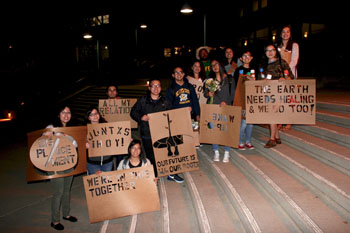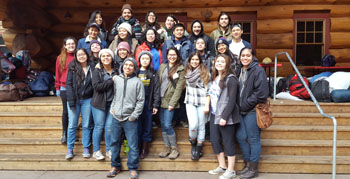Campus News
Making ‘green’ multicolor—and multicultural
The People of Color Sustainability Collective is getting high praise for increasing awareness about the various ways people of color contribute to sustainable practices


The words “green” and “sustainable” are often associated with cutting-edge 21st century practices and alternative lifestyle choices.
But Adriana Renteria (Stevenson ’15, environmental studies and economics), coordinator for the campus initiative called the People of Color Sustainability Collective (PoCSC), points out that certain “green practices” are older than the hills—a fact her organization is trying to make more widely known.
Now the PoCSC is getting high praise for increasing awareness about the various ways people of color contribute to sustainable practices, while holding dialogues about the intersections between race, class, ethnicity, gender, national origin, culture, and the environment.
Sometimes, those interested in sustainability can overlook the longstanding traditions that people of color bring to the table, including growing practices and lifestyle choices, said Renteria.
She draws attention to certain sustainable lifestyle and survival choices that are often labeled as practices of the “poor”—from riding the bus to work every day to hanging clothes to dry on a clothesline. With such practices in mind, the initiative works to “redefine sustainability in a way that recognizes that (sustainable practices) are within our cultures,” Renteria said.
In this way, the group seeks to re-examine the definition of sustainability; it seeks to make the sustainability movement more inclusive of different cultural practices and interpretations—a notion PoCSC hopes is embraced by environmentalists at large, since engaging and including more of the world’s population would advance the movement’s objectives.
PoCSC – which is housed under UCSC’s American Indian Resource Center — is innovative and unique because “it bridges what we do well (at UC Santa Cruz): diversity on the one hand and sustainability on the other,” said Flora Lu, one of the collaborators involved with PoCSC, and a faculty mentor for the initiative.
Lu, a professor of environmental studies at UC Santa Cruz, as well as provost for Colleges Nine and Ten, said the initiative wants to ensure that sustainability efforts “really resonate with the entire student body, in all of its diversity,” recognizing that people of different ethnic and cultural backgrounds have their own unique and valuable ways of relating to the land.
“Our relationships to place and our connection to stewardship of the environment: these really stem out of our social relationships with each other,” Lu said. “We sometimes think of nature as separate from culture; that separation is false.”
Engaging with events
PoCSC student interns—all of them interns at the campus’s Ethnic Resource Centers—have worked hard to put on a series of engaging events highlighting the initiative’s objectives.
The collective will host a workshop about environmental racism at the on-campus Practical Activism Conference on October 22. The workshop will focus, in particular, on environmental impacts confronting the communities of Bayview/Hunters Point in southeastern San Francisco and Kettleman City in Kings County, as well as the issue of “food insecurity” in South Central Los Angeles. This term relates to communities that have limited access to healthy foods.
This year, the collective was honored with a Chancellor’s Achievement Award for Diversity—impressive considering the collective is a relatively new presence on campus, having started as the hashtag #pocsustainability.
The hashtag was created by the Ethnic Resource Center directors to provide a platform for students to share stories about their cultural sustainability practices and push back against the false notion that communities of color don’t care about the environment.
“We at PoCSC are trying to weave together the connections between people and the different spaces across campus,” said Raymond LeBeau (Stevenson ’18, environmental studies), a member of the Pit River Nation in northeastern California. “It can be a difficult task. But the fact that PoCSC has grown from a hashtag into a campuswide initiative makes me feel that all of this work, growth, and interconnection is very important.”
Collaboration, research
As student response grew, the initiative began hosting small group discussions and events to create community on campus.
This initiative is the result of careful coordination among various organizations on campus; the PoCSC was founded in 2013 at the Ethnic Resource Centers, and is housed under the American Indian Resource Center and Director, Rebecca H. Rosser. Recognizing that this issue needs to be addressed by the whole campus, a collaborative partnership between Colleges Nine and Ten and the Campus Sustainability Office was established.
PoCSC has also been working with the campus Institutional Research and Policy Studies Office to undertake undergraduate research. PoCSC students will host student-led focus groups in the winter quarter and will present the results of the research and focus groups in early spring quarter. PoCSC will use the results of the research to plan future programming and develop resources.
This academic year, PoCSC is working to create a food justice online orientation program for all incoming students to explain what food insecurity is and highlight the resources that are available to help students address their needs.
“Responses (to PoCSC events) have been overwhelmingly positive,” Renteria said, noting that all events are open to students from every background.
Elida Erickson, campus sustainability director, praised the PoCSC for addressing a longstanding issue.
“Historically, the environmental conservation movement has not always been inclusive of diverse cultural viewpoints, and in some cases has championed initiatives that have directly marginalized certain groups,” she said. “One glaring example of this is the displacement of many native peoples from their land with the creation of national parks.”
Even within the university community, there are many examples of students of color feeling marginalized by their involvement with campus environmental movement, she continued.
“PoCSC has created a space for students of color to share their experiences, have a voice, and start shifting the direction of the conversation around environmental issues to be more inclusive of different cultural perspectives,” Erickson said.